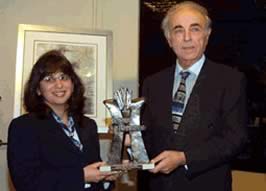 Sheila Fleischacker and Baruch Tenembaum
Sheila Fleischacker and Baruch TenembaumThe International Raoul Wallenberg Foundation (IRWF), a non-governmental organization created in Argentina, and the diplomatic Missions of the Vatican and Portugal to the UN remembered the humanitarian actions of the Portuguese diplomat Aristides de Sousa Mendes during the Holocaust.
The ceremony took place on April 3, 2001 on the day of the 47th anniversary of the diplomat’s death, at the auditorium of the Portugal legation, 590 Fifth Avenue, Manhattan.
Apostolic Nuncio Renato Martino on the Vatican’s behalf and Baruj Tenembaum, founder of the IRWF, gave a speech. A documentary about Sousa Mendes’ life was projected and the book ‘A Good Man in Evil Times’ was launched. The homage is part of the IRWF educational programs Diplomacy and the Holocaust and the International Committee Angelo Giuseppe Roncalli. Both initiatives were introduced by Tenembaum not only to the President of the Federal Republic of Germany, Johannes Rau in Berlin on March 7, 2001, but also to the Vatican’s State Secretary, Cardinal Angelo Sodano, among other world leaders.
Joao Crisostomo opened the ceremony on behalf of the IRWF. Afterwards, the Consul General of Portugal in New York, Ambassador José Carlos de la Cruz Almeida gave a speech and the Portugal Representative to the United Nations, Ambassador Antonio Monteiro, read a letter of support of the President of Portugals, Jorge Sampaio. Baruj Tenembaum presented the sculpture ‘Homage to Raoul Wallenberg’ to Sheila Fleischacker, Sousa Mendes’ grandaughter. This art piece was created by the Argentine sculptress Norma D’Ippolito. Crisostomo exhibited a Sousa Mendes’ portrait by Peter Malkin, the same artist who painted Raoul Wallenberg’s portrait over the railroad map of Poland.
Among others, the following supports were received: Great Rabbi Salomón Ben Hamú; Portuguese Ambassador to Buenos Aires, José Augusto Seabra; Israeli Ambassador to Buenos Aires, Benjamín Oron; Argentine Minister of the Interior, Ramón Bautista Mestre; Jewish Community President in Argentina, Hugo Ostrower; Secretary of Tourism of Argentina, Hernán Lombardi; Secretary of Culture of the City of Buenos Aires, Daniel Filmus; Mayor of the City of New York, Rudolph Giuliani and Nobel Peace Prize, Elie Wiesel.
During the ceremony it was announced that on April 3, 2002 the Sousa Mendes International Award will be given to whoever stands out worldwide by his/her spirit and actions of solidarity.
It is worth mentioning that the meeting was organized by a group of Portuguese voluntary butlers from New York City. In this regard, Tenembaum stressed that ‘Those of us who have been created in God´’s image can write our destiny and contribute with our best to help others, whatever role we play in our lives.’
THE STORY
Sousa Mendes was the General Consul of Portugal to Bordeaux, France, during the spring of 1940 when the Nazi’s blietzkrieg (lightning war) breached the French defense in Sedan on May 14.
A crowd of refugees of different nationalities, among them thousands of Jews, came to the French city with the hope of avoiding death by obtaining a transit visa to Portugal and from its ports to South America.
In spite of the orders of the Portuguese dictator Premier Antonio de Oliveira Salazar forbidding its diplomats to extend visas among other people ‘to Jews expelled from their countries of origin’, Sousa Mendes issued thousands of transit permits not only in Bordeaux but also in Bayonne and in the streets of Hendaye, on the Spanish border. Thanks to his actions it is believed that around 30.000 refugees were saved, among them 10.000 Jews avoided death in the Reich’s death camps. ‘I will give a visa to whoever needs it, either he/she can pay for it or not. I will act according to what my Christian conscience tells me to’, he used to say.
As he did not obey the dictator he was expelled without benefits of the Portuguese Foreign Service and the utterance of his name was forbidden for decades in Portugal. He lived the rest of his life like an outcast, he lost his house and died in poverty on April 3, 1954. Only in 1987 President Mario Soares awarded Sousa Mendes with the Order of Liberty and asked publicly for forgiveness to his relatives for the injustices that had taken place.
